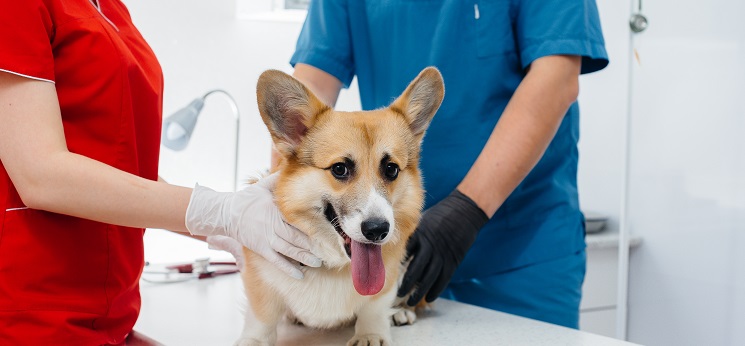Pet care is a big business, and the pandemic has made it bigger.
An Animal Medicines Australia report says Australians spend $12.2 billion annually on the pet industry.
And Nine business columnist Elizabeth Knight says the sector is “exploding”.
“The rise of the pooch (and to a lesser extent the feline) as a growing profit stream isn’t new. But its extension into new product areas is staggering,” she says.
Ms Knight cites vitamin wellness company Blackmores making pet vitamin supplements a main “focus growth area”, saying it could be a goldmine for the company.
“The ‘size of the prize’ (the addressable market in Australia and Asia) is $7.6 billion, according to Blackmores. It expects the pet business to deliver a compound annual growth rate of 9 per cent over the next four years to $100 million and the pet supplement business in China is expected to double over that period to reach $350 million.”
ABC News reports that “the humble family pet has morphed into a big business opportunity for Australian companies”.
“The pet industry is now so lucrative in Australia that major ASX-listed companies are throwing their money behind it, with hopes this will protect their businesses from COVID-19 induced downturn.”
Barry Codling, president of the Pet Industry Association of Australia, told ABC News people have recently become much more involved with their pets.
“We call it anthropomorphism. People are treating their pets more like they’re human. They are treating their pets like they are their children.”
He said that involvement dramatically increased during the pandemic, as Australians bought puppies and were at home with them more often.
“We had online sales of cat toys spike during the pandemic and even sales of dog outfits as people wanted to create Instagram accounts for their animals,” Mr Codling said.
“We used to say that the pet industry was global recession proof and now we say it’s COVID-19 proof.”
Scott Charters, the chief operating officer of Petbarn stores, says at the onset of the pandemic lockdowns sales rose so fast the company was concerned.
“We actually thought we had a bit of a bubble on our hands. People were panicking, they were going to pantry-fill and then we’d get an associated drop at the other end, and that drop just hasn’t happened.”
During 2020, Petbarn experienced 16 weeks bigger than Christmas. Mr Charters noted that the business performed similarly well during the global financial crisis.
In April 2020 in New South Wales, there was a 30 per cent increase in successful pet adoptions.
Rae Ciuzelis, owner of Ranc Pet Services, said 2020 was her busiest year to date for her high-end doggy day care company.
Mr Codling said the Blackmore’s move didn’t surprise him and that he believed at least one other major company would push into pet vitamins in 2021.
“We anticipate this will be a heavily contested space,” he said.
Industry analysts IBISWorld says pet food production is worth $2.6 billion a year in Australia and is projected to grow to $2.8 billion by 2026 as pet owners take to gourmet food options for their animals.
The IBISWorld data also shows sales of pet food and toys have grown 17.9 per cent year on year since 2015.
Ms Knight points out that dog owners are now willing to spend “$20 on wellness and vitality chews or $60 on puppy calm chews. It’s a concept that would have been considered absurd 10 years ago by just about everyone. (As a child growing up in the country our pet labrador lived outside, was thrown a bone each day and foraged for his own ‘treats’.)
“A 2.5kg bag of dog chow at the local supermarket cost around $20 compared with, say, $24 for a 10kg bag of rice (for human consumption),” she says.
“The cost of dog treats is even more extreme. It’s hard to find even a small bag of kangaroo kibble for less than $5, but it’s easy to buy a KitKat or a packet of chips for half that amount.”
She says doggy day care costs $66 per day, and dog walking generally costs around $20 per day and $40 on weekends.
Veterinary care is also extremely pricey.
Pet insurance is now sold by leading retailers including Coles, Medibank and Woolworths, providing pet owners with some coverage for veterinary bills. Some polices also cover funerals and cremation, another booming business.
In November, Australia’s largest funeral company InvoCare bought two pet cremation businesses for $50 million.
The move will turn the ASX-listed company into the country’s biggest supplier of pet cremations.
And where there is demand and huge spending, so are the business opportunities and the companies seeking their fortune.
Business Insider Australia listed four pet-related start-up ideas hoping to capitalise on the pet frenzy: CarePod new age travel crates; Mad Paws pet-sitting; CannPal medical cannabis; and specialty chow providers Scratch Pet Food.
Do you spend more on your pets than previously? What new pet products do you appreciate?
If you enjoy our content, don’t keep it to yourself. Share our free eNews with your friends and encourage them to sign up.
Related articles:
https://www.yourlifechoices.com.au/lifestyle/pets-and-australians-who-owns-what
https://www.yourlifechoices.com.au/lifestyle/pets-touch-and-covid-19-why-our-furry-friends-are-lifesavers
https://www.yourlifechoices.com.au/health/wellbeing/pets/are-pet-owners-happier

